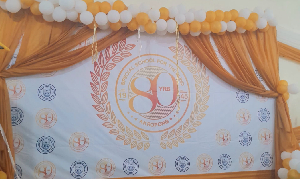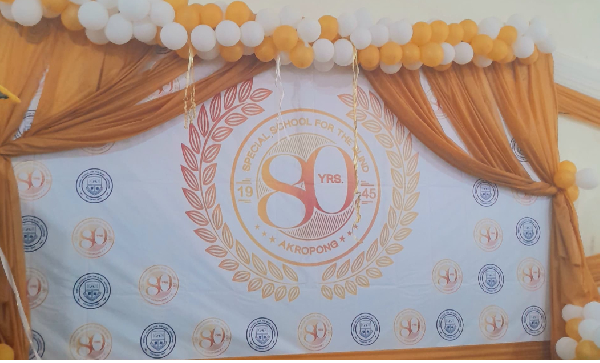 Akropong Special School for the Blind, has launched its 80th Anniversary celebration
Akropong Special School for the Blind, has launched its 80th Anniversary celebration
The Akropong Special School for the Blind, has launched its 80th Anniversary celebration in the Akuapem North Municipality of the Eastern Region.
The ceremony highlighted not only its decades-long impact but also the ongoing challenges of inequality, inadequate infrastructure, and financial barriers facing visually impaired learners in Ghana.
Held on the theme: “Affordable and Quality Education for the Blind in Ghana – 80 Years in Retrospect,” the launch attracted a distinguished gathering of traditional leaders, education stakeholders, dignitaries, and members of the public.
The school, established in 1945 with just four pupils, now boasts over 400 students and remains a national pillar in the provision of inclusive education.
Ms. Veronica Dery, the headmistress, described the 80th anniversary as both a celebration of resilience and a call to re-commit to the school’s mission.
She emphasized that while the school has produced countless graduates who have gone on to contribute to national development, its continued survival and growth depend on strategic partnerships and renewed national attention.
“This is a significant milestone, not just to mark our journey, but to renew our dedication to providing holistic education,” she said.
“We equip our students with academic learning, braille literacy, mobility training for late-blind learners, music, and vocational skills and tools that enable them to live independent, dignified lives,” she added.
Miss Dery acknowledged the government, churches, NGOs, philanthropists, and corporate bodies for their support over the years but appealed for continued investment to address urgent needs, particularly deteriorating infrastructure and lack of assistive technology.
Dr. Adams Awini, a lecturer at the University of Education, Winneba, giving the keynote address, urged the nation to reflect deeply on its commitment to inclusive education.
He noted that the anniversary must go beyond festivities and prompt uncomfortable but necessary questions about accessibility, affordability, and inclusivity.
“Eighty years ago, this school began with a dream that blindness should not equal exclusion.
“Today, we must ask ourselves: has education for the blind truly become accessible and inclusive? Or are we still leaving children behind because of their disability or poverty?,” he asked.
Dr. Awini cited realities such as students failing to return after vacation due to financial constraints, and a lack of essential learning tools like braille textbooks, mobility devices, and screen readers. “When these tools are missing, the promise of equity disappears,” he added.
Describing the school’s current state with broken fences, crumbling dormitories, and poor walkways, he said “these should be spaces of hope, not frustration. A child should never have to learn in an environment that tells them they are an afterthought,” he said.
Dr. Awini also highlighted the school’s remarkable alumni, including Ghana’s first female visually impaired lawyer, ICT experts, educators, and entrepreneurs. “Blindness does not block brilliance. We must stop sympathizing and start empowering. Our students deserve more than pity, they deserve opportunity.”
Representing the Okuapehene, Oseadeeyo Kwesi Akuffo III, Sompahene Nana Kwasi Ossew served as Special Guest of Honour and praised the school for its enduring legacy.
“If this school had not been founded, many dreams would have died,” he said.
“It is our collective responsibility to protect and support it.”
The chief emphasized that as the Akropong School for the Blind marks 80 years of dedicated service, the true message should be one of reflection and responsibility.
While notable progress had been made, he stressed that lasting change would only come when the nation boldly addressed systemic challenges through purposeful policies and a collective commitment to equity and inclusion.
“The school remains a beacon of hope, but only continued investment, advocacy, and inclusion can light the path forward for the next generation,” Nana Ossew said.
Watch the latest episode of Health Focus below:


